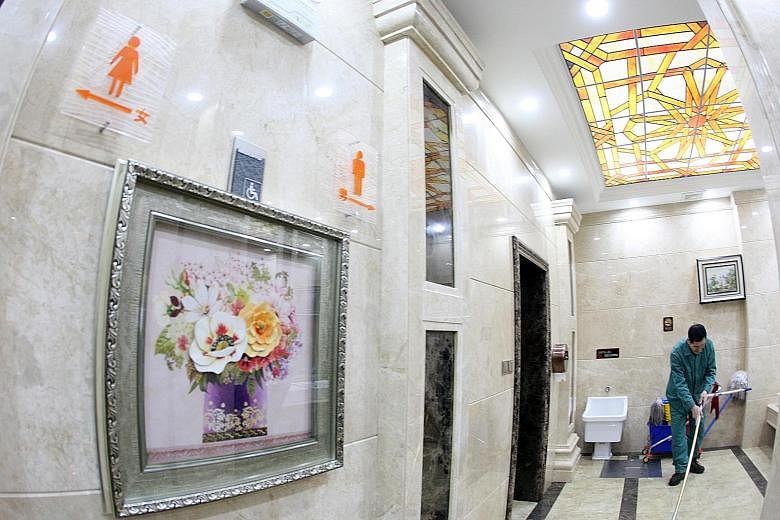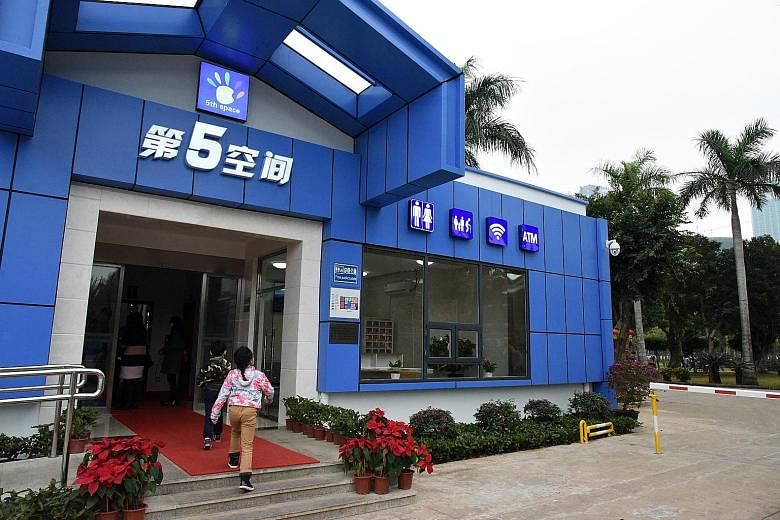BEIJING • China plans to spend over 12.5 billion yuan (S$2.6 billion) to build or upgrade tens of thousands of public restrooms at popular tourist attractions this year.
The investment is part of a three- year campaign to bring its toilets up to international standards as the country seeks to promote tourism as a new economic growth engine.
Over 25,000 toilets will be built or upgraded this year. Last year, more than 22,000 new toilets were built and nearly 7,700 were renovated, according to the China National Tourism Administration (CNTA).
Energy- and water-saving as well as deodorisation technology will be applied in the new toilets, said the agency, which has partnered the Bill and Melinda Gates Foundation to research and promote ecologically and environmentally friendly toilets in remote inland plateau provinces.
The so-called "toilet revolution" campaign, launched and endorsed by Chinese President Xi Jinping early last year, has led to what the Financial Times described as "a golden age of lavatory construction".
-
'Early release on Fridays' to boost domestic travel
-
Starting this month, government employees from two Chinese cities have been told to take two Friday afternoons off each month under a new scheme to boost domestic travel.
The move is aimed at encouraging people to make short-haul trips in the country, reported Sunday Morning Post.
But the compulsory longer weekends might not mean less time at the office, said the Post. Employees could be told to deduct the time from their annual leave or to make up for it later.
Similar schemes took place in Shangrao in Jiangxi province and Ningxiang county in Changsha, Hunan province, last year after China's State Council issued a circular calling for more flexible holiday systems to boost local tourism and spending.
Jinzhong city in Shanxi province and Jian city in Jiangxi province are the latest two cities to take part in the scheme, which will end on Oct 31.
The private sector can choose whether to follow suit, the Post reported.
But Mr Guan Feng, owner of Migu Coffee, which has seven branches in Shanxi, said he did not expect an upswing in business simply because the rules did not apply to private enterprises.
"The new arrangement will encourage people from Jinzhong to travel to nearby cities where some of my shops are located, but I don't think the number will be significant," he told the Post.
China's domestic travel market has become the world's largest tourism market, according to the Global Times.
There are about 25,000 travel agencies in China, which has more than 20,000 scenic spots.
More than 13.5 million people are employed in the tourism industry.
China's massive spending on roads, railways and airports has also contributed to the boom in domestic tourism.
But inadequate funds, underdeveloped utilities and the lack of coordination among government officials are some of the challenges faced by the authorities.
Another big problem has to do with users' bathroom etiquette.
"Many people spend a lot of time dressing themselves but they don't spare a second to flush the toilet," said CNTA director Li Jinzao.
"Toilet civilisation has a long way to go in China," he was quoted as saying by China Daily. The newspaper reported that the authorities are mulling over a blacklist that will target "uncivilised behaviour" in public toilets, although it is not clear how China plans to enforce it.
Public urination and defecation, especially by children, remain common in China, even as the quality of public infrastructure has improved over the past two decades.
Frequent breakdowns of toilets are common because of improper use and vandalism, reported Caixin magazine on its website.
The CNTA did not say how much it costs to manage a public restroom, although some estimated that it could be as high as 100,000 yuan a year for a moderately equipped facility and about 150,000 yuan a year for a better-equipped one.
The issue of public toilets is the weakest link in the development of China's tourism industry, said Mr Li.
A dirty toilet is all it takes to destroy all promotional efforts, he said.
Australian tourist Jeniffer Smith still remembers her unpleasant experience when answering the call of nature during a China trip a decade ago. But she was impressed with the changes in public toilets during a recent visit.
"We were surprised and happy to find that toilets in tourist resorts have become clean, supplied with toilet paper and hand-washing lotion. It is nice to see that some of the toilets were designed and built with beautiful Chinese architectural styles," she told China Daily.
Tourism is among the emerging consumption-focused service industries Beijing is promoting as part of efforts to reduce reliance on manufacturing and construction.
Chinese travel agencies hosted tourists for the equivalent of 112 million single-person days in the fourth quarter of last year, up 17 per cent from a year earlier. Total travel spending rose 15 per cent to 3.03 trillion yuan in 2014, according to the Financial Times.


